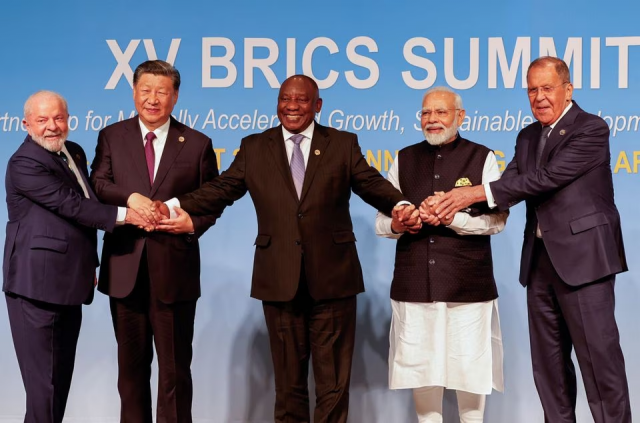Pakistan’s economic problems a hurdle to joining BRICS
Many countries interested in becoming part of emerging economies’ bloc

The 15th BRICS Summit kicked off on August 22 in Johannesburg, South Africa.
The theme of this year’s event is “BRICS and Africa: Partnership for Mutually Accelerated Growth, Sustainable Development, and Inclusive Multilateralism.” “The meetings being held from August 22 to 24 are very important where some key decisions are expected to be announced.
I think the most essential thing that the summit is likely to discuss is the expansion of BRICS,” said Amjad Zarin, Associate Professor at Riphah International University, Islamabad.
“So far, many countries have shown their interest in joining, including Saudi Arabia, Iran, Indonesia, Egypt, Ethiopia and Argentina.
The criteria for this should also be confirmed.” BRICS is a grouping of the emerging economies of Brazil, Russia, India, China and South Africa.
As an important platform for cooperation among emerging markets and developing countries, BRICS is an open and inclusive mechanism.
More and more countries have applied to join the bloc and hope to receive its cooperation.
“We were invited and became BRICS member in 2010, which makes us the first beneficiary of BRICS expansion, and we are fully aware of its benefits,” stated Dr Siyabonga Cyprian Cwele, South African Ambassador to China.
After joining BRICS, South Africa’s trade with other BRICS countries has increased significantly, especially with China, with which it has grown exponentially, the ambassador added.
China was one of South Africa’s trading partners before 2009, but not the largest.
After South Africa joined BRICS, China became South Africa’s largest trading partner for years.
“BRICS’ countries represent almost 41% of the world’s population.
It is a big market in the world,” analysed Muhammad Karim Ahmed, Programme Manager of Pakistan Broadcasting Corporation (PBC), who is also the author of Pakistan- China Relationship and China Development.
“These BRICS countries are emerging economies and they have improved their country, their economic conditions, manufacturing, and found markets for themselves through joining the bloc.
In any case, being a BRICS member would be very fortunate for Pakistan,” Ahmed observed.
“About 40 countries are participating in this year’s BRICS summit, while the name of Pakistan has not appeared anywhere.” He pointed out that the biggest problem banning Pakistan from joining BRICS is its economic problems.
“Besides, the agreement that Pakistan has with the International Monetary Fund (IMF) also caused great difficulties.
BRICS economies are all quite stable.
Until Pakistan improves its economic conditions, BRICS membership may be difficult,” he noted.
There are opportunities attached to BRICS expansion as its members can tap a huge market.
As Pakistan has easy access to China, India and Russia by road and by sea, it has advantages to join the group and build more connections with the members, Ahmed hoped.
THE ARTICLE ORIGINALLY APPEARED ON THE CHINA ECONOMIC NET



















COMMENTS
Comments are moderated and generally will be posted if they are on-topic and not abusive.
For more information, please see our Comments FAQ